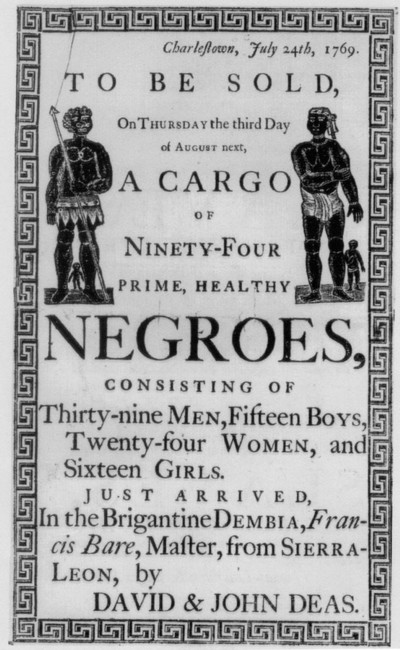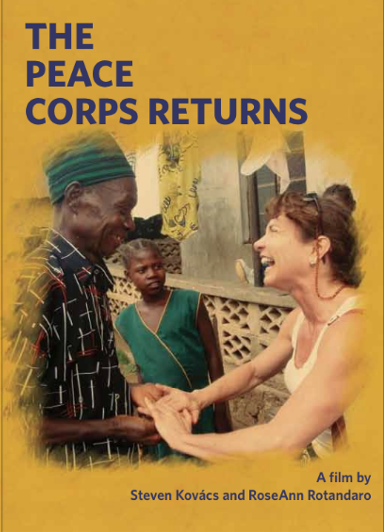 Among the forty plus slave forts that operated along the coast of West Africa, a fort off the coast of Sierra Leone, Bunce Island, was unique in its close ties with the New World. Bunce provided slaves for close to 200 years, into the 1800s, to plantations across the Atlantic. It has been estimated that at least half of the African-Americans who descended from slaves can trace their family lineage to Sierra Leone. It is with this tragic historical connection in mind that The Village Link was formed.
The Village Link began its journey of a thousand miles more than three decades ago when RoseAnn Rotandaro, a director of The Village Link, took a single step: she joined Peace Corps. Assigned to Sierra Leone, she grew very fond of the country and, especially, the pastoral village of Golu, tucked away near the Sewa River.
Among the forty plus slave forts that operated along the coast of West Africa, a fort off the coast of Sierra Leone, Bunce Island, was unique in its close ties with the New World. Bunce provided slaves for close to 200 years, into the 1800s, to plantations across the Atlantic. It has been estimated that at least half of the African-Americans who descended from slaves can trace their family lineage to Sierra Leone. It is with this tragic historical connection in mind that The Village Link was formed.
The Village Link began its journey of a thousand miles more than three decades ago when RoseAnn Rotandaro, a director of The Village Link, took a single step: she joined Peace Corps. Assigned to Sierra Leone, she grew very fond of the country and, especially, the pastoral village of Golu, tucked away near the Sewa River.
 In 1990, a brutal civil war erupted in Sierra Leone that lasted eleven years, killing an estimated 50,000 and leaving the country’s infrastructure in demise. Many villages in the vicinity of Golu were destroyed. Eleven years after the war ended, Ms. Rotandaro--now an attorney representing high-tech companies in Silicon Valley--returned to Sierra Leone with hopes that the place and people she had grown to love decades earlier had survived the atrocities committed. She harbored a particular hope that the Fillie family, who lived with her in her Peace Corps provided house, was still alive.
In 1990, a brutal civil war erupted in Sierra Leone that lasted eleven years, killing an estimated 50,000 and leaving the country’s infrastructure in demise. Many villages in the vicinity of Golu were destroyed. Eleven years after the war ended, Ms. Rotandaro--now an attorney representing high-tech companies in Silicon Valley--returned to Sierra Leone with hopes that the place and people she had grown to love decades earlier had survived the atrocities committed. She harbored a particular hope that the Fillie family, who lived with her in her Peace Corps provided house, was still alive.
The village of Golu and the Fillie family survived. Repeated rebel invasions during the war period had forced villagers to flee their homes; Mr. Fillie lost his job as the head teacher in the village. Like many, the Fillies escaped into the bush and existed by subsistent farming methods. But the villagers resettled Golu after the war ended. The older ones remembered Ms. Rotandaro and welcomed her warmly. This profound human connection led to the idea of using computers, technology, and the Internet as development tools in places like Golu. Ms. Rotandaro returned to California, resigned from her law practice, and started The Village Link, a nonprofit organization.
Several statistics help to emphasize the need for the educational resources The Village Link will provide. Education in Sierra Leone is legally required for all children for six years at the primary level and three years at the secondary level, but a shortage of schools and teachers has made implementation impossible. The Sierra Leone Civil War resulted in the destruction of 1,270 primary schools, and in 2001, 67 percent of all school-age children were out of school. The situation has improved considerably since then with primary school enrollment doubling between 2001 and 2005, and with the reconstruction of many schools since the end of the war. There is still a very long way to go. The U.N. publishes the human development index which measures three basic dimensions of human development: a long and healthy life, access to knowledge, and a decent standard of living.
The Sierra Leone 2013 Human Development Report reveals:
• Life expectancy at birth: 48 years, • Mean years of schooling of the adult population: 3.3, and • Percent of the population living in multidimensional poverty: 77%.
The 2010 UNICEF statistics for Sierra Leone show:
• Total adult literacy rate: 41%; • Youth literacy rate (male): 68%; • Youth literacy rate (female): 48%, and • Gross national income per capita of $340.
Sierra Leone’s human development index value places it in the low human development category, almost at the bottom of the list.
Past, Present, and Planned Activities of The Village Link:
TVL aims to build resource centers for education and entepreneurship worldwide in underserved areas. Incorporated as a nonprofit in California, The Village Link has commenced operations in Sierra Leone, West Africa with sustainability, self-sufficiency, and development at the forefront of its mission.
The Village Link uses appropriate technology, computers, networks, and systems to link impoverished communities with opportunities to solve local problems and provide education, vocational training and cultural preservation. The resource centers will be a modern form of the Carnegie library where people can acquire knowledge to improve themselves. By fostering local entrepreneurial efforts and developing communications links in and out of the villages, the centers will facilitate cultural, educational and commercial exchange. With literacy and access to learning tools as core objectives, the resource centers will serve all community members and include focused programs designed with women, children and the disadvantaged in mind. The Village Link will prioritize assistance to the smaller towns, villages and rural areas.
The Village Link’s pilot program, The Village Link Golu (“VLG”), has already built its resource center in Golu, a village in Baoma Chiefdom in Sierra Leone’s Southern Province. An impoverished economy of subsistence rice farming, Baoma chiefdom still struggles to recover from its heavy impact during civil war in Sierra Leone (1990-2001). Golu residents provided labor and local materials such as sand and gravel to build its resource center. The Village Link provided funds and materials. A technology consulting firm based in Freetown, the SBTS Group, provided a server, generator, computer, and critical operations advice. Several dedicated Sierra Leonean university students provided essential volunteer help. Maintenance of the center in Golu has been entrusted to the village.
The Village Link will launch programs at VLG in 2013 utilizing over 300 e-learning courses and certification programs in the areas of computer technology, business, and life skills. Already, VLG has been partially equipped with tables, benches, computers and e-readers. The Village Link recently teamed up with Worldreader to pre-load 100 kindles with digital books and other learning materials for the VLG resource center, which will serve as both a library and a vocational school for the village. Cell phone charging, printing, and photocopying services will also be provided at VLG.
Initially, VLG will receive electricity from a generator provided by SBTS Group. However, Village Link plans to switch to solar power as soon as funds can be raised for it. For help with solar installations, Village Link has connected with two nonprofits: Barefoot College, an Indian organization http://www.barefootcollege.org/category/education/, and Energy for Opportunity, a Canadian nonprofit http://www.energyforopportunity.org/en/home/. Two experienced Sierra Leonean solar energy vendors have also provided bids for the project.
As its pilot project, the Village Link expects VLG to be an important stepping stone to providing technological tools worldwide to the many underserved communities that are brimming with potential and eager for development.